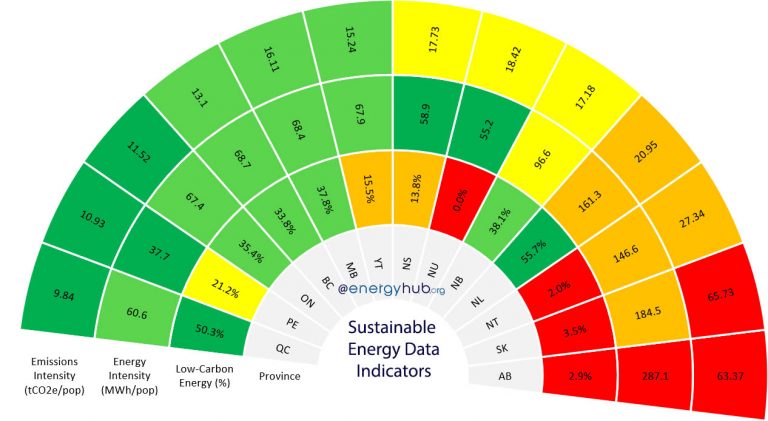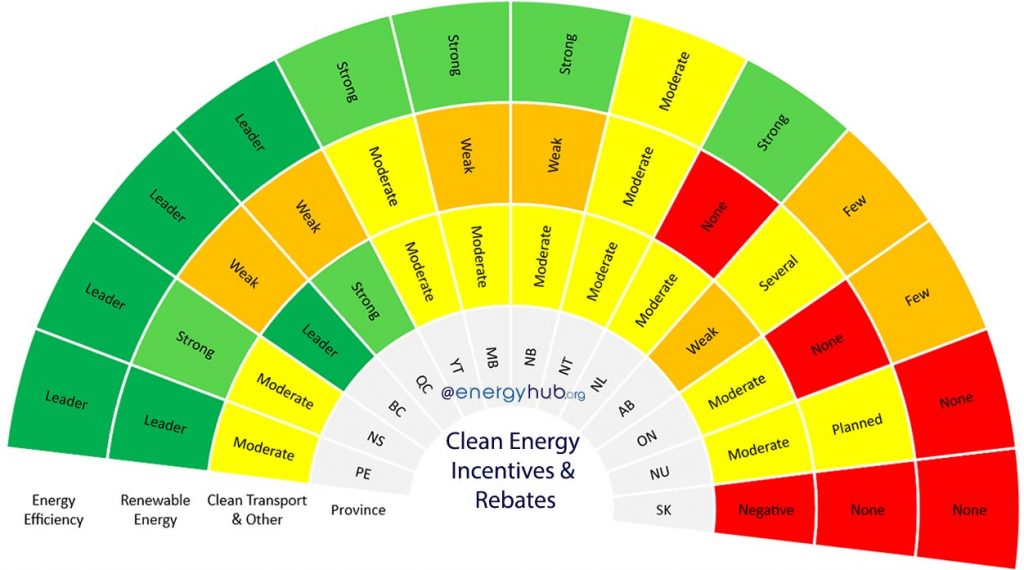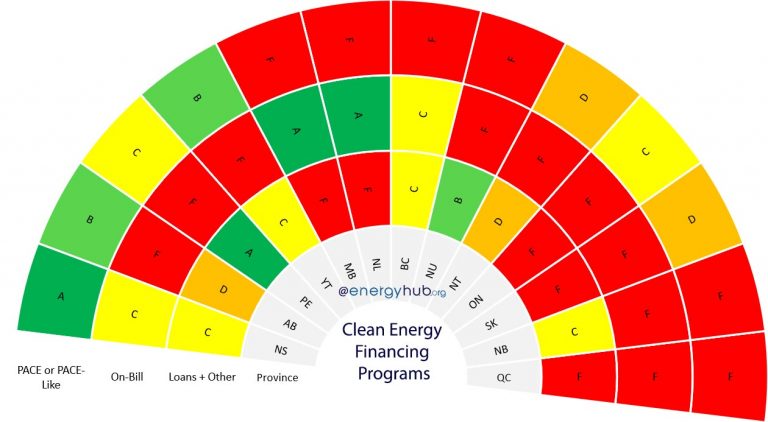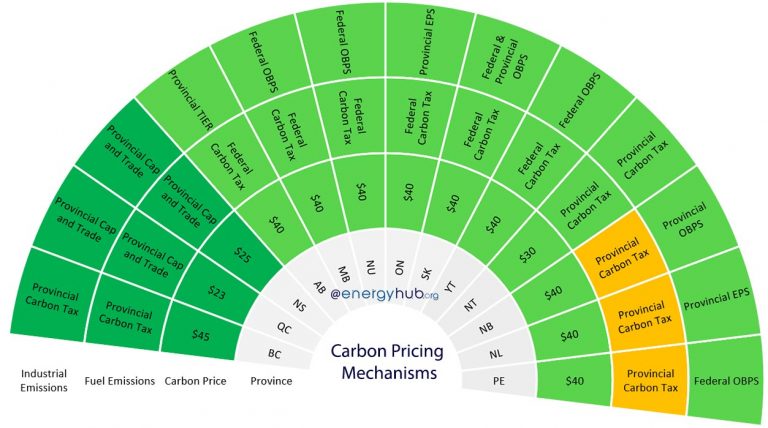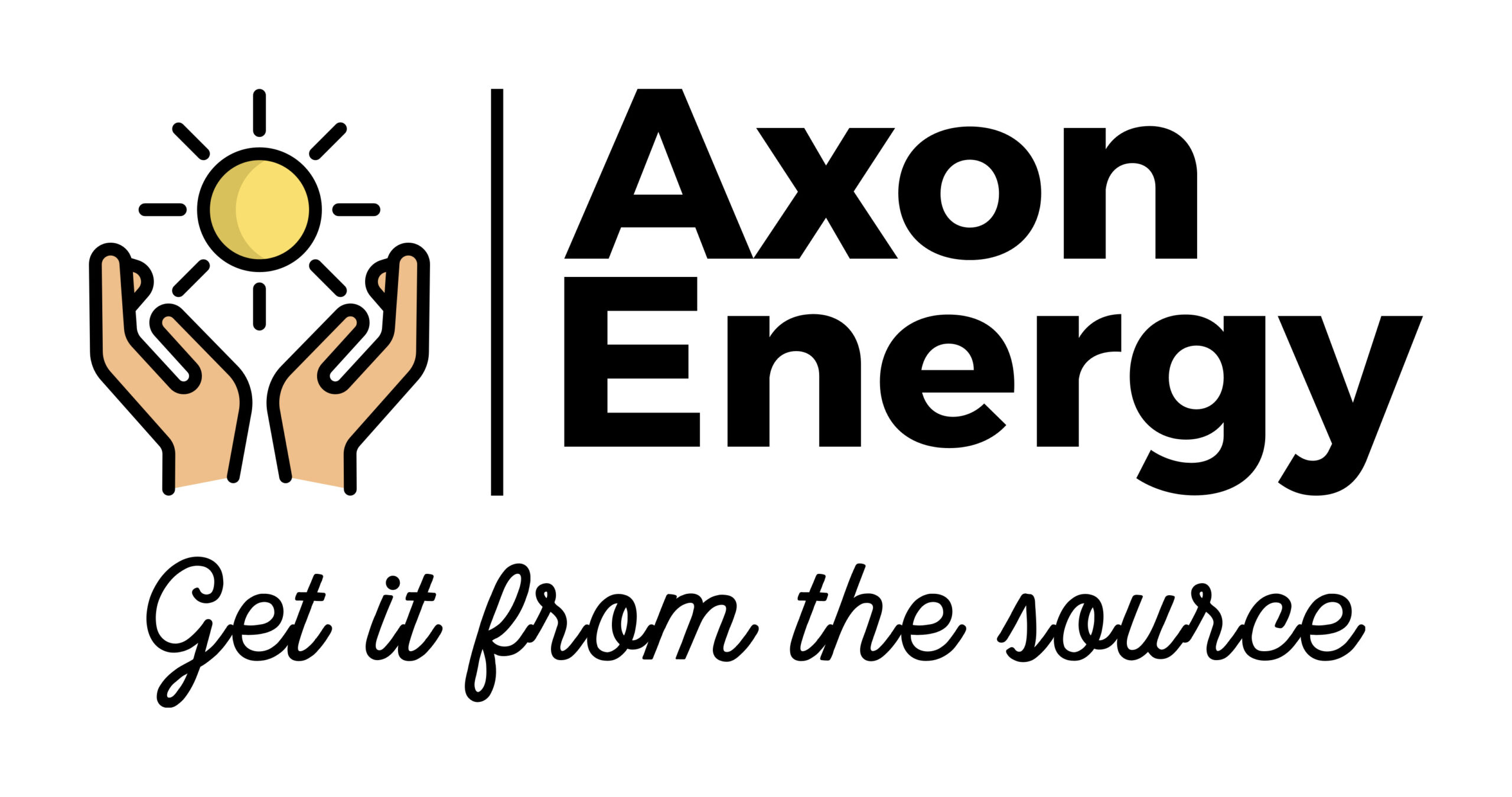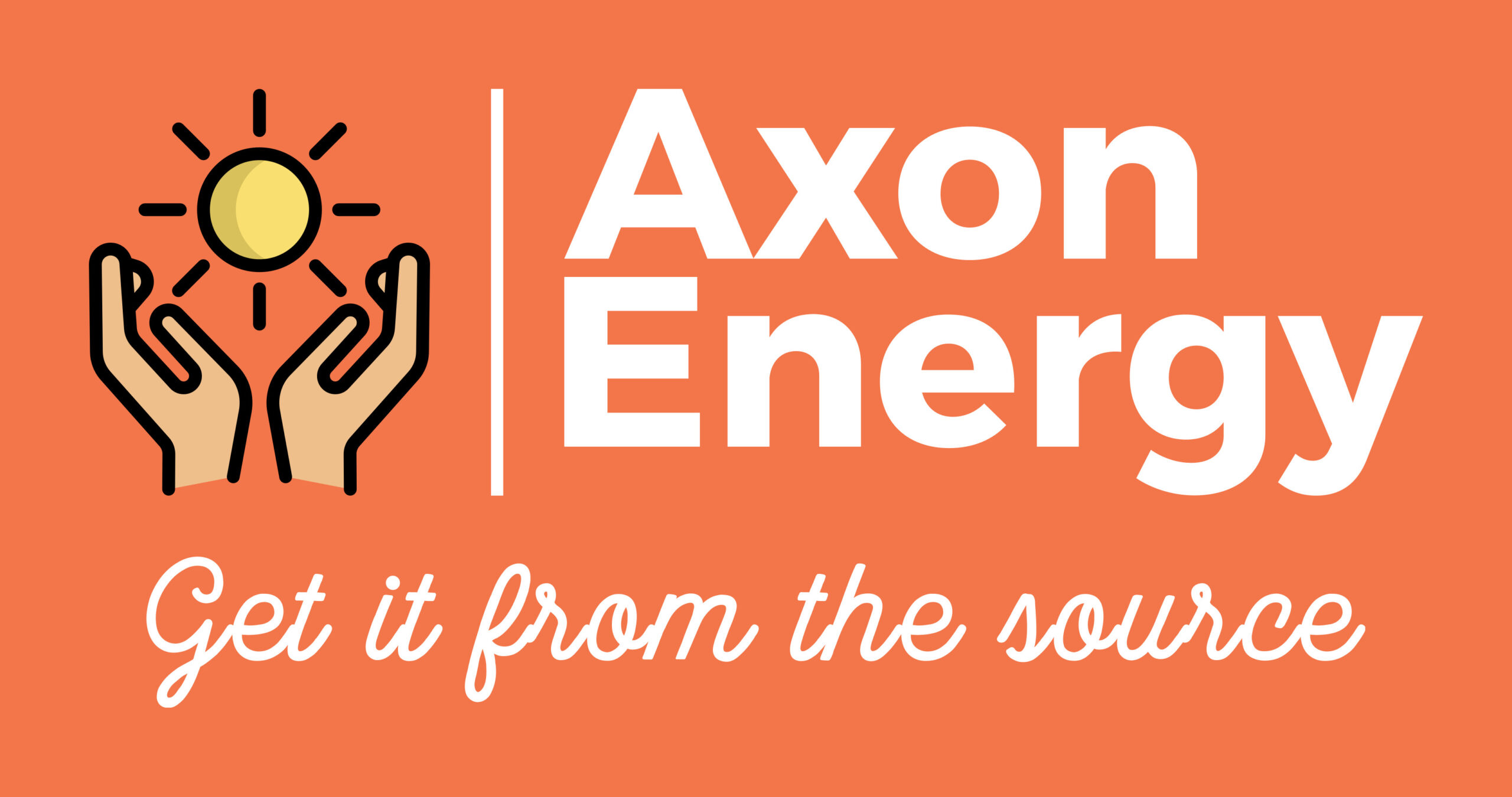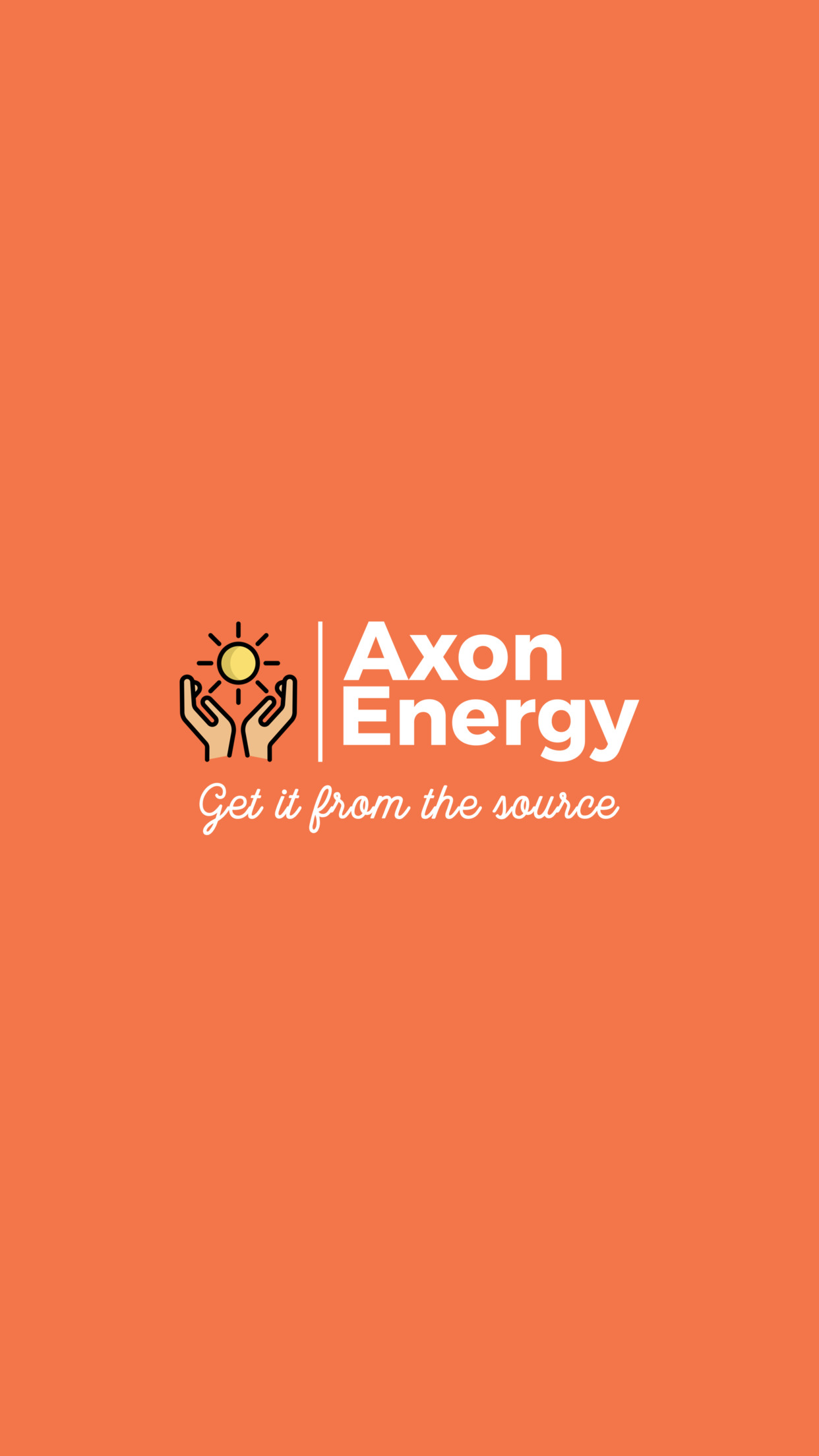Electricity Prices in Canada 2021
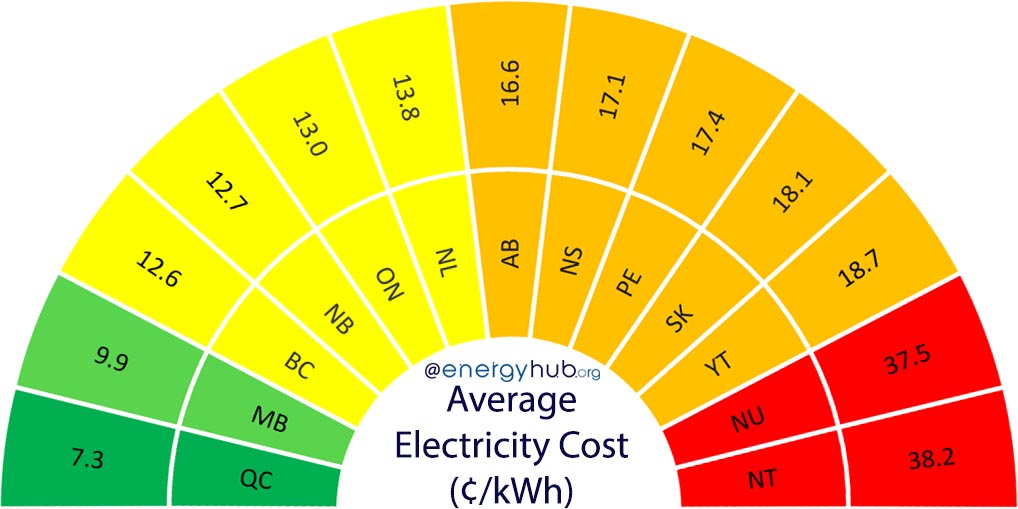
Average Electricity Prices
The average residential cost of electricity in Canada is $0.179 per kWh. This includes both fixed and variable costs and is based on an average monthly consumption of 1,000 kWh.
The average electricity cost decreases to $0.138 if you exclude the territories. Electricity costs in Canada have increased from $0.174 per kWh in 2020, and $0.135 if you exclude the territories.
| Alberta | 16.6¢/kWh |
| British Columbia | 12.6¢/kWh |
| Manitoba | 9.9¢/kWh |
| New Brunswick | 12.7¢/kWh |
| Newfoundland & Labrador | 13.8¢/kWh |
| Nova Scotia | 17.1¢/kWh |
| Northwest Territories | 38.2¢/kWh |
| Nunavut | 37.5¢/kWh |
| Ontario | 13.0¢/kWh |
| Prince Edward Island | 17.4¢/kWh |
| Quebec | 7.3¢/kWh |
| Saskatchewan | 18.1¢/kWh |
| Yukon Territory | 18.7¢/kWh |
| Canada Average | 17.9¢/kWh |
Québec has the cheapest electricity prices in all of Canada ($0.073/kWh), while the Northwest Territories has the most expensive electricity prices ($0.382/kWh).
The tables below show how average electricity prices change based on the amount of electricity that is consumed each month.
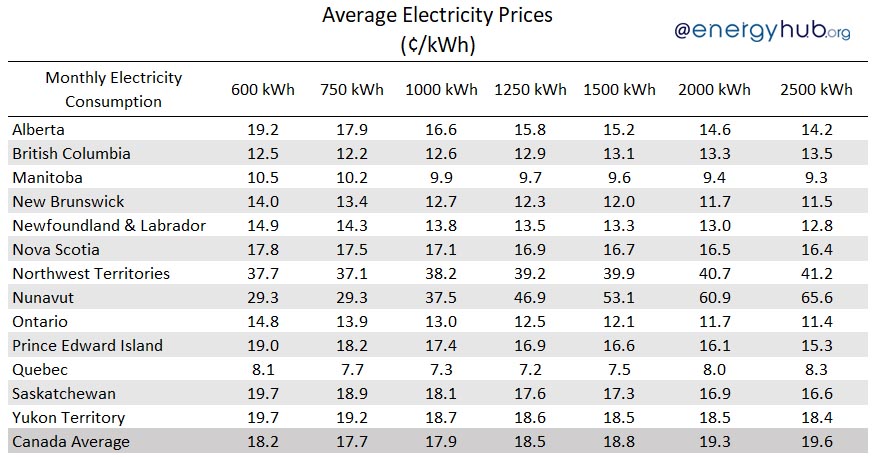

Note in the charts above that the average price per kWh goes both up and down (and at different rates), depending on the province you live in. This is because of differences in how electricity rates are designed.
Read the next section (Electricity Bill Rate Design) for more on this topic! See the Methodology and Data Sources sections for details on data collection and calculations.
Electricity Bill Rate Design

energyhub.org evaluates several elements of electricity bill rate design for our Provincial Solar Power Guides & Rankings. Rate design is important for distributed energy generation, efficiency, and conservation programs.
In our opinion, superior rate designs are the ones that allow you to save the most money when you save energy. This might sound intuitive – but not all provinces allow you to save the same amount of money.
For example, reducing your electricity bill from 1,500 to 750 kWh per month will save you 54% on your electricity bill in British Columbia, 48% in Nova Scotia, but only 41% in Alberta!
Superior designs have low fixed monthly fees and either tiered or time-of-use (TOU) electricity rates. Inferior designs have high fixed monthly fees and flat electricity rates.
Check out the first set of charts below to see how fixed monthly fees vary by province, and the second set to see how rate design (including price) affects the total average monthly electricity bill:




Methodology
Intro
Calculating average provincial electricity prices is a challenging task given the wide variation in market and rate structures across the country. For example, 6 provinces use predominantly tiered electricity rates that either increase (BC, NT, NU, QC, YT) or decrease (PE) as a function of electricity usage, 6 use predominantly flat rates (AB, MB, NB, NL, NS, SK), and 1 uses predominantly time-of-use rates (ON).
Additionally, the majority of provinces have a meaningful portion of their population served by at least 2 utility companies (AB, BC, NB, NL, NT, ON, SK) meaning that rates, riders, and tier thresholds often vary by location.
The prices presented on this page reflect our modeled calculations based on publicly available rate data, and are accurate as of March 11, 2021.
Electricity Bill Calculations
Electricity bills were calculated based on the total price charged to consumers, exclusive of sales tax. This includes basic monthly and variable energy charges, as well as appropriate riders, fees, adjustments and provincial rebates (NT, NU, ON). All provincial rates apply to the urban-residential rate class (or equivalent, specifics given in provincial sections below). All territorial rates also include rural and thermal rate classes to reflect the high proportion of communities living under these conditions.
Only utility companies serving a material proportion of the provincial or territorial population were considered. Both simple and weighted averages were used, depending on the relative proportion of people served by each utility. Only base rate structures were used, special and optional pricing programs (clean energy, long-term, fixed-rate) were not considered.
Data Validation
This year, we compared our results to Hydro-Québec’s 2020 electricity price study. Our final calculated prices vary from Hydro-Québec’s results by 0-23%. Of course, variation is expected given differences in study time frame (March 2021 vs April 2020) and coverage (provincial average vs single cities) between our studies.
For example, Maritime Electric in Prince Edward Island recently increased their rates (contributing to our higher calculated prices). In most cases, the difference is simply explained by the fact that we used rates from multiple provincial utilities in our calculations.
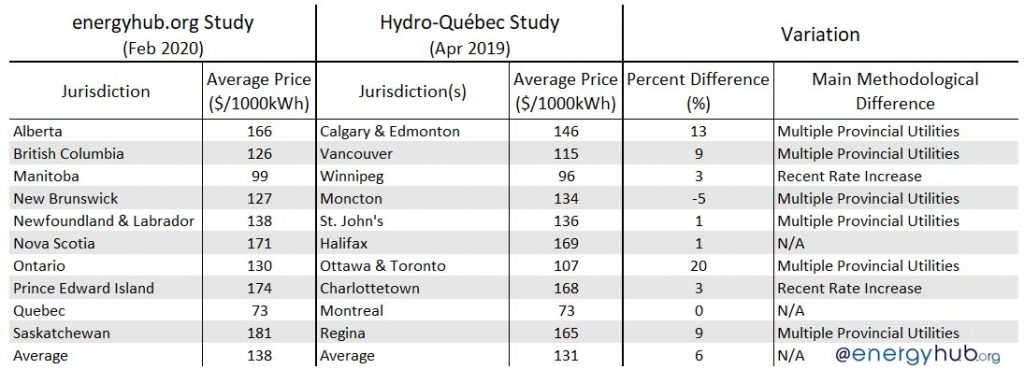
Data Sources
Alberta
The average residential cost of electricity in Alberta is $0.166 per kWh, or $166 per month, assuming an average monthly usage of 1,000 kWh. This is down from $0.167 per kWh, or $167 per month in 2020.
Our model is based on energy rate data published by the Alberta Utilities Commission. The retail energy rate was calculated using a simple average of all monthly regulated rates (un-capped) in the previous 9 months for Direct Energy, ENMAX Energy, and EPCOR Energy.
In previous years, we performed a bottom-up calculation to capture the average cost of distribution charges, transmission charges, rate riders, local access fees, administrative charges, and other adjustment riders. This year, we took a simplified top-down approach and based our calculations on the “typical electricity bill in Alberta“. We then made assumptions for the portion of these fees that were fixed and variable before coming up with our final calculated values.
British Columbia
The average residential cost of electricity in British Columbia is $0.126 per kWh, or $126 per month, assuming an average monthly usage of 1,000 kWh. This is up from $0.124 per kWh, or $124 per month in 2020.
We used the tiered residential rates from BC Hydro and Fortis BC to calculate prices in BC. Both utilities bill on a 60-day period, so fixed customer charges and tier thresholds were divided by 2 to arrive at monthly numbers. Each utility was weighted equally.
Manitoba
The average residential cost of electricity in Manitoba is $0.099 per kWh, or $99 per month, assuming an average monthly usage of 1,000 kWh. This is up from $0.096 per kWh, or $96 per month in 2020.
For our calculations, we used the standard residential rate data published by Manitoba Hydro.
New Brunswick
The average residential cost of electricity in New Brunswick is $0.127 per kWh, or $127 per month, assuming an average monthly usage of 1,000 kWh. This is the same price as it was in 2020.
To calculate electricity rates in New Brunswick, we used the average urban residential rates published by NB Power and Saint John Energy. Each utility was weighted equally.
Newfoundland & Labrador
The average residential cost of electricity in Newfoundland and Labrador is $0.138 per kWh, or $138 per month, assuming an average monthly usage of 1,000 kWh. This is the same price as it was in 2020.
We used the residential rates published by Newfoundland Power and Newfoundland Labrador Hydro in our calculations. Each utility was weighted equally.
Nova Scotia
The average residential cost of electricity in Nova Scotia is $0.171 per kWh, or $171 per month, assuming an average monthly usage of 1,000 kWh. This is up from $0.150 per kWh, or $150 per month in 2020.
All data came from domestic rates published by Nova Scotia Power, the Fuel Adjustment Mechanism was also taken into account.
Northwest Territories
The average cost of electricity in Northwest Territories is $0.382 per kWh, or $382 per month, assuming an average monthly usage of 1,000 kWh. This is down from $0.387 per kWh, or $387 per month in 2020.
To calculate rates in the Northwest Territories, we used a weighted average of price data published by the Northwest Territories Power Corporation and Northland Utilities. To account for the Territorial Power Support Program, our model effectively uses tiered pricing with a threshold of 800kWh per month (the average of the two seasonal allowances). Appropriate adjustment riders were accounted for. Both hydro and thermal rates were used.
Nunavut
The average cost of electricity in Nunavut is $0.375 per kWh, or $375 per month, assuming an average monthly usage of 1,000 kWh. This is the same price as it was in 2020.
Our calculations used an average of all community prices published by Qulliq Energy Corporation, and take into account the Nunavut Electricity Subsidy. The subsidy threshold was averaged between the two seasons.
Ontario
The average cost of electricity in Ontario is $0.130 per kWh, or $130 per month, assuming an average monthly usage of 1,000 kWh. This is up from $0.125 per kWh, or $125 per month in 2020.
Our model uses the time-of-use rates published by the Ontario Energy Board and assumes that 68% of consumption happens off-peak, 18% mid-peak, and 18% on-peak. We also take into account the updated Ontario Electricity Rebate.
Variable delivery and regulatory charges are based on the OEB Bill Calculator and averaged across Alectra Utilities, Atikokan Hydro, Centre Wellington Hydro, Hydro One, London Hydro, Niagara-on-the-Lake Hydro, Hydro Ottawa, Toronto Hydro, Veridian Connections, and Wasaga Distribution.
Prince Edward Island
The average cost of electricity in Prince Edward Island is $0.174 per kWh, or $174 per month, assuming an average monthly usage of 1,000 kWh. This is down from $0.168 per kWh, or $168 per month in 2020.
For our calculations, we used the tiered residential urban rates published by Maritime Electric.
Québec
The average cost of electricity in Québec is $0.073 per kWh, or $73 per month, assuming an average monthly usage of 1,000 kWh. This is the same price as it was in 2020.
The tiered residential rates published by Hydro-Québec were used for our calculations. We assumed uniform daily usage.
Saskatchewan
The average cost of electricity in Saskatchewan is $0.181 per kWh, or $181 per month, assuming an average monthly usage of 1,000 kWh. This is down from $0.182 per kWh, or $182 per month in 2020.
There are three major utility companies that serve electricity in Saskatchewan: Saskpower, Saskatoon Light and Power, and Swift Current Light and Power. Rates vary slightly by utility and in our calculations, we took the average of all three. Standard city residential rate classes was used.
Yukon Territory
The average cost of electricity in the Yukon Territory is $0.187 per kWh, or $187 per month, assuming an average monthly usage of 1,000 kWh. This is down from $0.145 per kWh, or $145 per month in 2020.
For our calculations, we used the rates and riders published by Yukon Energy and Atco Electric Yukon, excluding the rates for Old Crow. All three price tiers were used in our model.
More Clean Energy Reference Guides
